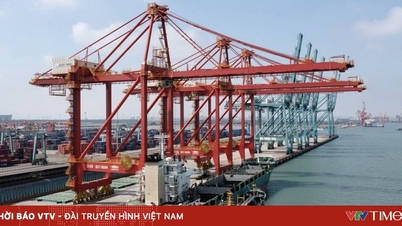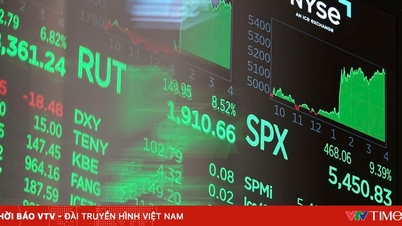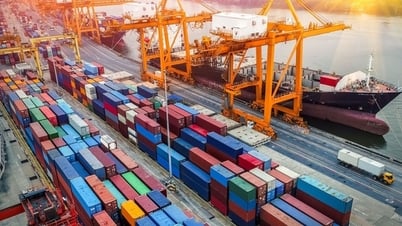 |
| The global economy is showing resilience. Pictured, Times Square in New York City, USA. (Source: Reuters) |
Steadfast in the face of shock
The dramatic events of the past few years have left a significant “economic legacy”.
On December 31, 2019, the World Health Organization (WTO) was informed of a series of worrying cases of mysterious pneumonia in China. By March 2020, the Covid-19 pandemic had officially appeared in the world and dealt a heavy blow to global economic growth in the next two years (2021 and 2022).
Just as the world was emerging from that crisis, Russia launched a special military operation in Ukraine in February 2022. Oil prices soared, fueling inflation. Supply chains, already battered by the pandemic, were thrown into further chaos. Meanwhile, Europe halted almost all trade with Moscow, its largest energy partner.
Along with that comes the collapse of cryptocurrencies, the work-from-home “revolution” and the increasingly noticeable presence of artificial intelligence (AI) in everyday life.
Faced with the above changes, chief economist of the International Monetary Fund (IMF) Pierre-Olivier Gourinchas commented: "The global economy is showing stability, not being 'knocked down' by the major shocks that have occurred in recent years. However, growth is not at a very good level.
We are witnessing a sluggish global economy with no clear signs of recovery. Geopolitical and economic disintegration, low productivity growth and unfavorable demographic trends are leading to a slowdown in growth over the medium term.
"Keep an eye" on China and the Russia-Ukraine conflict
China's cooling economy is something to watch closely in 2024. China is the world's second-largest economy and has a huge influence on the global economy.
What China's economy will look like in 2024 is an important question, says Sushant Singh, a senior fellow at the Centre for Policy Research in India.
Earlier this year, the World Bank warned that the instability of the world's second-largest economy would have a severe impact on the whole of East Asia - one of the world's major economic engines.
However, Mr. William Reinsch from the Center for Strategic and International Studies (CSIS) is optimistic about China's prospects.
"They (China) have some very strong export sectors like electric vehicle batteries, consumer electronics, minerals. These sectors are highly competitive globally and that will not change," the expert emphasized.
This year, the military campaign in Ukraine in particular will still significantly affect the global economy in 2024. For Mr. Sushant Singh, this is still the most important variable.
The expert emphasized: "The special military campaign in Ukraine has affected three issues: Food, fertilizer and fuel."
He cited the Russia-Ukraine conflict as having had a profound impact on global energy and food markets over the past two years, with the world's poorest people being hit hardest.
Election fever around the world
In fact, 2024 is the biggest election year in history. More than half the world's population (8.1 billion people) live in countries around the world that are preparing to vote.
| The global economy is showing resilience, not being 'knocked down' by the major shocks that have occurred in recent years. However, growth is not very good either. |
The US, India, Brazil, Pakistan, Indonesia, Türkiye, Mexico, Bangladesh and possibly the UK are among the countries that will hold important votes. In particular, the US presidential election is decisive.
There are also many other factors and events that could happen this year. The green transition in many sectors and the rapid development in AI are likely to be at the forefront of discussions around the world.
Yet events like the Covid-19 pandemic and the extraordinary military operation in Ukraine show us that the unexpected and unpredictable often have the greatest impact.
“What I worry about more are the ‘black swan’ events,” said CSIS’s Reinsch. “These are unpredictable events that lead to strong reactions from the world.”
The worst is probably over
Inflation has slowed significantly in the world’s advanced economies, but interest rates remain high, and some experts believe the effects of tightening monetary policy will begin to be felt in 2024.
“The global economy is not as weak as we thought after all the shocks from 2020 to now,” said Adam Slater, chief economist at Oxford Economics. “But in my view, global growth will be weaker in 2024.”
Many experts expect that global Gross Domestic Product (GDP) growth will not be much different in 2024 compared to 2023. However, there are also opinions that GDP will decrease.
The Organisation for Economic Co-operation and Development (OECD) expects global growth of 2.7% this year, down from 2.9% in 2023. The IMF sees growth at 2.9%, while the European Central Bank forecasts growth of 3%.
S&P Global Market Intelligence forecasts global economic growth in 2024 at 2.3%, lower than the estimated 2.7% in 2023. Fitch Ratings forecasts global economic growth in 2024 at only 2.1%, down from the estimated 2.9% in 2023.
Although global growth is forecast to slow in 2024, the worst is probably over and headwinds are expected to ease, analysts say.
The fact that the global economy has avoided a new recession, along with optimistic signals such as: increased consumer spending, production recovery, continued decline in unemployment rate and inflation on the decline... are boosting confidence in a bright global economic outlook this year.
Source






![[Photo] Solemn opening of the 8th Congress of the Central Public Security Party Committee, term 2025-2030](https://vphoto.vietnam.vn/thumb/1200x675/vietnam/resource/IMAGE/2025/10/4/f3b00fb779f44979809441a4dac5c7df)
![[Photo] General Secretary To Lam attends the 8th Congress of the Central Public Security Party Committee](https://vphoto.vietnam.vn/thumb/1200x675/vietnam/resource/IMAGE/2025/10/4/79fadf490f674dc483794f2d955f6045)


























![[Infographic] Notable numbers after 3 months of "reorganizing the country"](https://vphoto.vietnam.vn/thumb/1200x675/vietnam/resource/IMAGE/2025/10/4/ce8bb72c722348e09e942d04f0dd9729)
![[Photo] Students of Binh Minh Primary School enjoy the full moon festival, receiving the joys of childhood](https://vphoto.vietnam.vn/thumb/1200x675/vietnam/resource/IMAGE/2025/10/3/8cf8abef22fe4471be400a818912cb85)





























































Comment (0)